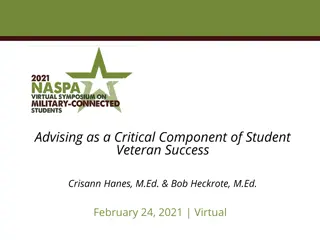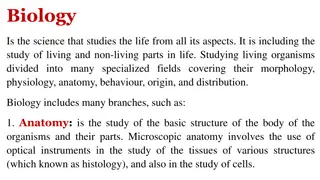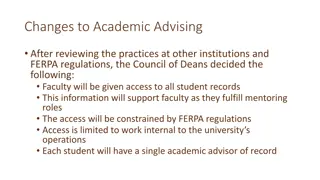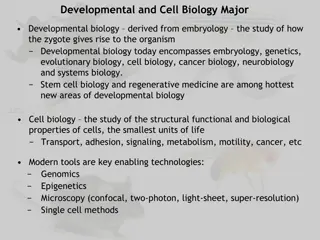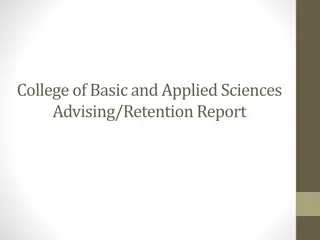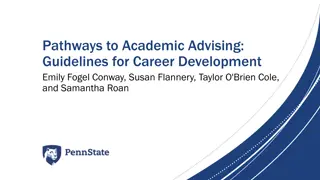Biology Major Academic Advising Overview
This overview covers the aims and expectations of a Biology major academic advising session, including requirements for graduation, grades, advisor information, and supporting courses. It details the importance of meeting academic standards, selecting electives, and understanding credit hour distributions for Biology majors. The content emphasizes the significance of advisor support in navigating educational pathways and achieving career goals particular to the field of Biology.
Download Presentation

Please find below an Image/Link to download the presentation.
The content on the website is provided AS IS for your information and personal use only. It may not be sold, licensed, or shared on other websites without obtaining consent from the author.If you encounter any issues during the download, it is possible that the publisher has removed the file from their server.
You are allowed to download the files provided on this website for personal or commercial use, subject to the condition that they are used lawfully. All files are the property of their respective owners.
The content on the website is provided AS IS for your information and personal use only. It may not be sold, licensed, or shared on other websites without obtaining consent from the author.
E N D
Presentation Transcript
Biology Major Academic Advising
Aims of this Session Familiarize Students with Requirements for Graduation Familiarize Students with Requirements of the Biology Majors Check Your Progress toward Graduation Answer any Scheduling Questions for Next Semester Release your Advisement Hold
Advising Who has to be advised? What can an advisor do for me? How do I find out who my advisor is? TopNet, Student Services, Registration, View Advisor Information Advisor Expectations
The ABCs of Grades A, B, C, D, F Fn, W? Grade requirement for Biology majors C or better Academic Standing Minimum 2.0 GPA for Biology Majors Financial Aid and Grades
Requirements for Graduation 120 Credit Hours; 42 must be 300 or 400 level Major in Biology 36 Credit hrs. (#617) requires a minor (18 hours) 48 Credit hrs. (#525) no minor required Major in Medical Technology (#582) Major in Biochemistry (#519) General Education; 44-45 credit hours Really 36 Hours (double dip the Math and Science)
Requirements for the Biology Majors Biol 120/121 and 122/123 (8) Biol 222/223 or Biol 224/225 or Biol 226/227 (4) Biol 319/322 or Biol 327 (4) Biol 315 or Biol 430 (3-4.5) Electives to reach 36 or 48 hrs. Select electives in consultation with your advisor
Required Supporting Courses Math 116 and 117, or higher Phys 231/232 or 255/256 Chem 120/121, and Two of the following: Agro 350, 452, 454, 455 & 456, 457 & 458, Biol 283, Chem 222/223, Chem 314 or Chem 340/341, Chem 330, CIS 343, CIS 226 or CS 226 or CS 230, Geog 316, Geog 317, Geog 415, Geog 417, Math 136, Math 137 or Math 142, Math 305, Math 307, Phys 332/233 or Phys 265/266, Socl 302. Required for most health professions
General Education Cat. A (Org./Comm.) Eng 100, Eng 300, Comm 145 or 161, Foreign Lang. (102) Cat. B (Humanities) Eng 200, + 6 hours Cat. C (Soc./Beh. Sci.) Hist 119 or 120, + 6 hrs Cat. D (Math & Sci.) Double dip from Major and/or Minor Cat. E (Culture) 3 credit hours Cat. F (Health) 2 credit hours
What should I have completed during Second Year English 200 Math 117 Phys 231/232 Biol 222 or 224 or 226 (+lab) Biol Supporting Course Course in Minor or Additional Bio Course Cat. B Elective Cat. C Elective Approx. 60 total credit hours First Year English 100 Comm 145 or 161 Hist 119 or 120 Math 116 Chem 120 & 121 Biol 120 & 121, 122 & 123 Cat. F Elective Approx. 30 total credit hours
Graduation Reality Minimum of 120 hours needed 12 hour minimum to be full time BUT 12 hours X 8 semester = 96 hours 15 hrs/semester = 120 hours in 4 years Or winter and summer hours can be taken to supplement spring and fall classes Developmental courses Failing a course
iCAP Degree Audit for your major What if Audit TopNet Student Services iCAP (Interactive Degree Audit)
Tips for Academic Success Attend class Notify your instructor before missing a class if possible Do the required reading Complete assignments on-time/early Keep coursework high on your priorities Academic Dishonesty will earn you an F, or worse Check your WKU email/Blackboard every morning
More Tips for Academic Success Get to know your instructors Get to know your academic advisor Treat school as a full-time job (40 hours a week) Make study time a regular part of your day Make friends in class the kind that will help you, not the kind that will distract you Get tutoring/help when you need it Get involved in your Major s student organizations Student Resources and Organizations
In Conclusion: Enjoy your time at WKU. Make new friends. Learn. Participate in campus activities. Get to know your advisors and instructors. Prepare for an exciting future.
Biology Advising Center TCNW Room 203 270-745-2638 Biology.advising@wku.edu Major and Minors Fair September 19, 2012 at the Raymond B. Preston Center






